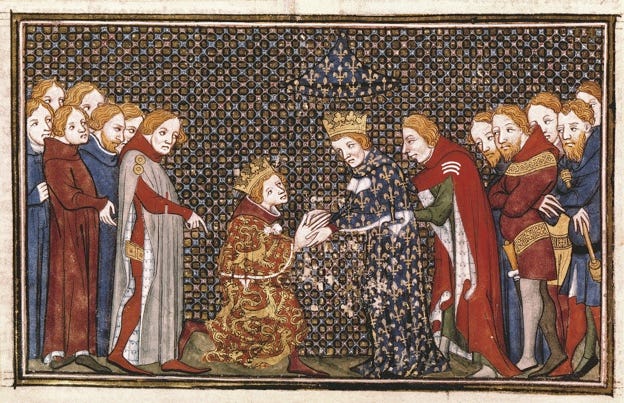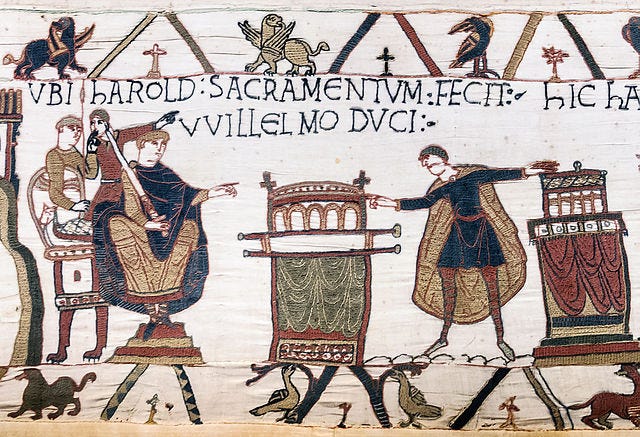Welcome, new readers, to our exploration of the world of Richard the Lionheart (episode 1 here), and his friends and enemies. Today we’re exploring the network of obligations surrounding Richard and his friends and enemies. But first, some music—we start each post with some music from the era.
Bernart de Ventadorn was a famous troubadour who frequently applied the language of medieval power—slave, lord, liege, vassal, paying homage—to romantic relationships. A translation of some of Bernart’s lyrics by Dr. Carol Symes of the University of Illinois Urbana-Champaign illustrate this perfectly (from her article on the intersection of chivalry, soldiery, and the troubadours):
An example can be the famous lyric of Bernart de Ventadorn, one of the protégés of Eleanor of Aquitaine:
When leaves and grass are lush with renewed growth
The beauty of my lady blossoms forth …
I am her slave, her vassal, she my lord;
I pay her homage, hope to have a word
Of kindness, or of love, exchanged for mine
But she is cruel: she will not make a sign.1
I mentioned Richard’s friends and enemies, but as Falstaff put it, in the movie The King, “A king has no friends, only followers or foes.” Or Stannis Baratheon in A Game of Thrones: “Kings have no friends, only subjects and enemies.” (Having been a CEO, I can say that the situation as CEO is not quite that bad—but it’s close.)
I’m currently researching Richard’s time in Cyprus, where he met Guy de Lusignan, who at that time was the King of Jerusalem. Which got me to thinking again about how insanely inbred and interconnected the ruling class was in Richard’s time. And how that generated a web of conflicting loyalties—sometimes honored, sometimes not. They all knew each other, and mostly they all hated each other. That dynamic is one of the things I find most fascinating about this era.
Consider: Richard’s mother Eleanor of Aquitaine was first married to Louis VII, King of France, then to Richard’s father, King Henry II after her divorce from Louis. Eleanor’s father was married to his father’s mistress’s daughter (details here). Nice, right? Louis would go on to father a child with his third wife—the child was Philip, who would become King Philip the II. Philip was Richard’s best “friend” until he was Richard’s worst enemy. Richard would be engaged to Philip’s half-sister Alyx for over twenty years, eventually marrying Berengaria of Navarre instead. Richard would be at war with his father, or his brothers, or both, and with Philip, for much of his life. His brother John would be a thorn in Richard’s side his entire life, becoming King John after Richard’s death. Richard’s sister Joanna would become Queen of Sicily after marriage to King William. His sister Eleanor would become Queen of Castile.
The web of loyalities and obligations came from two sources: marriage and the feudal system. In the feudal system (simplified here), Kings own land, then essentially grant “tenancy” rights to Dukes/Counts/Knights (the “middle management”), who in turn grant tenancy rights to peasants or serfs (usually with layers in between). Peasants work the land, pay taxes to the “middle management” and the middle management in turn “pay homage” to the King - they promise fidelity, obedience and loyalty (fealty), and (usually) military service, in return for their right to manage the lands and collect revenue from their tenants. The King is their “liege lord”, and they are his “vassal”. If a Knight had land from a Duke, the Knight is the vassal of the Duke who is the vassal of the King, and the King is the liege lord of the Duke who is the liege lord of the Knight, and so on. This has less to do with “country” or “nation”, and more to do with who owns the land one is on.
In today’s parlance, when we say someone “pays homage” to someone, we mean they are praising them (or their memory after they die), or imitating their style. The medieval term means something slightly different. It means you owe them something.
There were formal ceremonies and oaths to record this debt/promise.2345 The vassal would approach the liege lord, kneel, and offer his hands, clasped together. The lord would encircle the vassal’s hands with his own, signaling his protection, and the vassal would recite an oath, something similar to this:
“I become your man with respect to the tenement which I hold of you… and I will bear you fealty in life and limb and earthly honour… saving the faith owed the lord king and his heirs.”6

Then the vassal would rise, and the liege lord would bestow a kiss, signaling the pact was complete. Thereafter one might hear the phrase, “I am your man,” which was a recognition that fealty (loyalty) has been sworn. (Note that this relationship is not necessarily between two men; a woman might pay homage for lands she holds, or conversely accept it from a tenant.)
The form and verbiage of the oath varied, but medieval scholars of the era identified six obligations of a vassal to a liege lord:7
to keep his lord safe,
to protect him from harm,
to preserve the lord’s justice,
to prevent damage to his possessions, and
to assist his lord in the carrying out of his duties.
to not hinder his lord in the carrying out of his duties.
As with our legal and political systems, much of this web of obligations was only as solid as the willingness of the participants to obey the rules, and such willingness was often in short supply, as we shall see in a moment.

Etymology
The word homage is derived from the French word homme, or “man.” Homage equating roughly to “I am your man.” The word vassal comes from the medieval Latin vassallus, meaning "manservant, domestic, or retainer." The origin of the phrase “liege lord” is a bit murkier, but probably derived from the German ledig (“free” or “empty”), or Old French “lige” (“free”), or the Latin laetus (“a semi-free colonist”), or perhaps from Old French or Proto-Germanic words meaning “to lease or rent.” I like this last possibility as it captures the meaning well. If you say to yourself “lease lord” for “liege lord”, you pretty much have it.
Who was Richard’s boss before he became King?
It’s complicated. Richard of course owed fidelity to his father King Henry, but he also “paid homage” to Philip, for Richard’s land holdings in the Aquitaine—he was “Duke of Aquitaine.” So he theoretically owed obedience to two men, both of whom hated the other, so Richard got caught in the middle often. And in practice, Richard was not especially obedient to either :). Richard first rebelled against his father, with Philip’s assistance. After Henry died and Richard was King of England, he would be deeply at odds with Philip, during the Third Crusade and thereafter, a conflict that would eventually lead to his death. During Henry’s life, Henry himself owed homage to Louis (and eventually Philip), so that when Henry wanted to (re)dispose of some of his lands in Aquitaine during his lifetime, he needed Louis’ permission to do so, and said permission was not forthcoming, because Louis was demanding the Richard finally marry Alyx. It’s all very confusing, isn’t it? Can’t a king just do what he wants?
As King of England, Richard was answerable to nobody but God; as Duke of Aquitaine, in matters pertaining to his lands in France, he was subservient to Philip—again, theoretically.
Richard was vassal to Philip, but strangely enough there was another King who was vassal to Richard! A king reporting to a king reporting to a king.
Last week we talked about Richard’s sail from Messina, Sicily to Cyprus, his last stop before the Holy Land (link below). I’ve been researching his time in Cyprus, and one of the (many) interesting incidents that occurred there was the visit of Guy de Lusignan, King of Jerusalem.
Guy is an interesting character; you may know him from the movie Kingdom of Heaven. This is the same Guy de Lusignan, who, early in his career, tried to kidnap Eleanor of Aquitaine, Richard’s mother, wounding the famous William Marshal in the process. William would nearly kill Richard when Richard was rebelling against Henry, but would shortly thereafter come over to Richard’s side. (This incident recounted here, by the way). Again, all the shifting loyalties are fascinating.
In the meantime, Guy has run off the Holy Land and married himself a crown, becoming King of Jerusalem. So, Guy is King of Jerusalem. Fellow king, peer to Richard, his equal, right?
Not so fast.
Guy de Lusignan held lands in Aquitaine (Poitou), which Richard controlled, so Guy owes homage (obedience) to Richard, for his lands in Aquitaine. He is King, but is in some sense subservient to Richard (and also, as the leader of the Crusaders at the disastrous battle of Hattin, severely weakened politically). There are kings, and then there are kings… When Guy came to Cyprus, he came to ask Richard’s help restoring him to the throne of Jerusalem-after Hattin, he has lost Jerusalem to Saladin, and Philip is promoting Conrad of Montferrat as the replacement King, as a) Guy isn’t that effective, and b) Guy is vassal to Richard and Philip wants Jerusalem controlled by someone loyal to him, not Richard.
Think of these titles like jobs. You can have two of them, and you would likely then have two bosses. You might be self employed at one (“king”) and employed in a “real job” somewhere else (say, “duke”), with a real boss. Henry was King of England, but Duke of Normandy (as well as Duke of Aquitaine, Count of Anjou and Maine, and other areas). Except for England, all of that was inside the Kingdom of France, and so Henry owed homage (obedience) to Louis (and then Philip) for those lands, so what happened there theoretically required Louis’ approval. Whereas Henry could do whatever he liked in England. Two jobs, two bosses. And in reality, Henry was vastly more powerful and wealthy than his nominal “boss”, Louis. As Richard was far more powerful and wealthy than Philip, not that it helped him in the end.
https://www.wondriumdaily.com/allied-culture-of-chivalry-and-courtliness/
I am grateful to Dr. Carol Symes of the University of Illinois Urbana-Champaign for permission to quote her translation of Bernart, and for pointing me toward many excellent troubadour resources, for example, https://www.oxfordbibliographies.com/display/document/obo-9780195396584/obo-9780195396584-0148.xml. All errors are my own, of course.
https://sourcebooks.fordham.edu/source/1275fealtyhomage.asp
https://www.wondriumdaily.com/allied-culture-of-chivalry-and-courtliness/
https://aprilmunday.wordpress.com/2017/12/10/paying-homage-in-the-middle-ages/
http://legalhistorysources.com/Feudal%20OathBrundage.htm
https://amesfoundation.law.harvard.edu/Bracton/Unframed/English/v2/232.htm
https://www.academia.edu/5347854/Feudal_Oath_of_Fidelity_and_Homage






